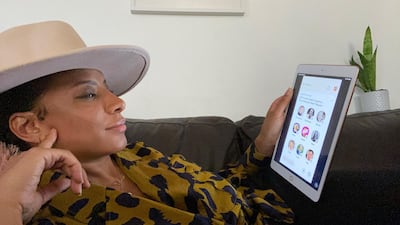In the modern world, we’re not short of communication tools. Whether it’s at work, home or while commuting, the number of platforms at our disposal leaves us spoiled for choice and we are rarely out of reach, or offline. It’s a saturated market with little to no room for an additional player.
Or so we thought.
Enter Clubhouse. The social audio app has recently topped eight million downloads globally, despite being pre-launch and invitation-only. In an ever connected and interconnected world, Clubhouse's success is undeniably noteworthy.
Across the Middle East, hundreds of thousands have jumped on the Clubhouse bandwagon, hosting their own rooms and sessions on a number of topics, ranging from discussions on the next decade of Indian Tech to weekly book clubs.
But its very architecture – unregulated and unlicensed – does not bode well. In China it has been blocked and Oman banned its use due to lack of authorisation, privacy and distribution issues as well as its potential for misuse. Meanwhile in the UAE, while it hasn't been banned outright, users have reported slow connection speeds that render the app practically unusable.
The apparent ease of reverse-engineering the app by third parties to make it available on different software is ringing alarm bells about security and privacy.
With these red flags already raised, the question on the minds of many, including our own, is how much of the app’s growth and success is sustainable? The verdict is still out on if it’s here to stay, with the debate polarised between those deeming it a long-term trend, and others who believe it’s merely a passing fad.
We are of the latter opinion. Our (club)house view is the hype will eventually fade out. Here’s why.
A social audio app will not fare well when the world re-opens and people can be social in person again. Extended isolation translates into a longing for connection. In solitude and boredom, individuals are constantly looking for creative ways to socialise. Facebook, TikTok et al help in this regard, but their narrow and similar functionalities mean users will look elsewhere eventually and jump at the first sight of differentiation.
Clubhouse has had that effect. Its appeal has been that everybody has a voice, and no topic is off limits. It also helps that the app’s invitation-only model instills "Fomo" – or the fear of missing out – that is difficult to bypass. Exclusivity breeds desire, but sustainability remains a question mark: what happens when the app becomes available to the masses?

Clubhouse works best in a very specific setting too: isolation. Users have to be in quiet surroundings and in full focus. The need for privacy and concentration constricts the time and place of its use to dedicated periods of the day. Its real time nature, lauded as one of its unique features, also means if there are no interesting conversations happening then and there, users are likely to be discouraged and will ultimately opt out.
As things start going back to normal, it seems unlikely people will take and make time out of their day to isolate themselves for an app that, regardless, has very limited functionality.
From a lack of purpose to a lack of structure, Clubhouse suffers from what others have termed "lower-quality-per-minute". The app’s use case is narrow and apart from setting up rooms, hosting conversations and raising your hand, there isn’t much else to do. While its unique and unstructured nature is intriguing, the novelty will wear off as users start to feel restricted.
Podcast advocates will argue that voice is a compelling medium, but without substance, quality content and room for engagement and interaction, the app is just a large university lecture hall on an iPhone. Sceptics have been quick to point out the absence of video means there is no way to ascertain a listeners’ reaction. In the absence of a systematised topic selection process, users will eventually get bored.
Our experience with Clubhouse has made one thing abundantly clear. For entrepreneurs in emerging markets, the desire to exchange, connect and learn is substantial. The app allows them to connect with others regardless of geography, stage, or experience. Clubhouse may disappear, but the need for start-ups to share is never ending.
While we suspect its popularity to plummet by the end of the summer, our plan is to continue to ride the wave, while keeping a curious and attentive eye on what the Clubhouse team has in store.
Basil Moftah is a general partner at Global Ventures, a Dubai-based growth-stage venture capital firm


